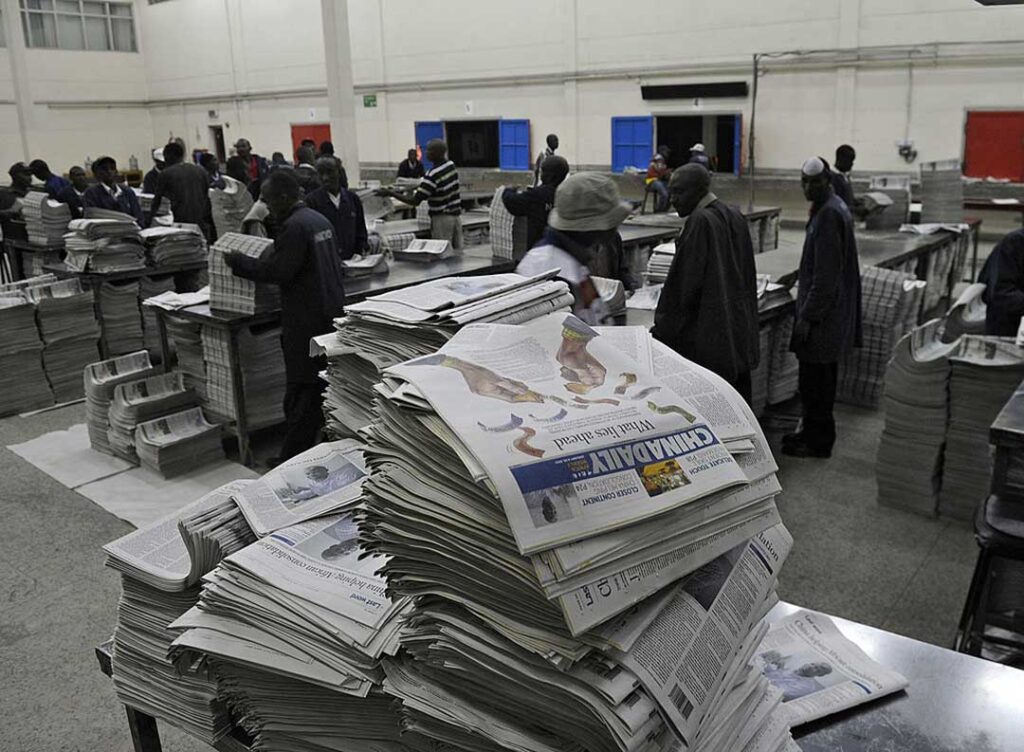ADF STAFF
China’s inroads into Africa’s media environment began in 2006 when Xinhua, the Chinese national news agency, moved its regional headquarters from Paris to Nairobi, Kenya.
“There seemed to have been a realization that Nairobi could be used as a launching pad,” Joseph Odindo, former editorial director at Kenya’s Nation Media Group and now editorial director at Standard Group, told DW.com.
Over the past 15 years, China’s media influence campaign has run parallel to its Belt and Road Initiative (BRI) construction projects. Kenya, home to several BRI projects, has become the hub for China’s expanding African media footprint.
Broadcaster CGTN (China Global Television Network) is based in Nairobi. The China Daily newspaper has an office there as well, as do China Radio International and satellite broadcaster Star Times.
Chinese-owned media outlets have hired hundreds of Kenyan journalists, offering job security and good salaries in a region where those can be hard to come by.
“A desk, a telephone and regular pay are all positives in countries where these are luxuries,” Jeremy Dear of the International Federation of Journalists (IFJ) told the Reuters Institute.
CGTN alone employs about 200 African journalists alongside 50 Chinese nationals. CGTN is viewed on televisions in the halls of the African Union headquarters in Ethiopia as well as — thanks to the Star Times satellites — in rural villages in Ghana, Rwanda and beyond.
China also has rapidly expanded its influence over Africa’s own publications, reporters and news environment using a multipronged approach: buying shares in or providing advertising revenue to African media outlets, building personal contacts with high-ranking editors and publishers, and bringing African journalists to China for all-expenses-paid training sessions.
“The point about their presence is that, consolidated, it is a very powerful weapon for projecting the Chinese perspective,” Odindo said.
A recent survey of journalist unions by the IFJ found that, as China has expanded its influence on media outlets worldwide in recent years, coverage of China has grown more favorable. That’s been especially true across Africa.
“China’s large-scale medical diplomacy campaign has also provided propaganda wins in many developing countries, burnishing Beijing’s image as a reliable partner,” the IFJ study reported. “Anecdotal reports indicate that Beijing has stepped up its content offerings, in particular by tailoring content including disinformation for specific countries and translating state-run messages into local languages.”
China uses its leverage over African media outlets to drive favorable coverage. South Africa’s Independent Online (IOL) news provider offers an example of how that works.
IOL’s current owner, South Africa-based Sekunjalo Investments, bought the media outlet in 2013 with the help of the China International Television Corp. and China Africa Development Fund. Together, the two Chinese entities have a 20% ownership stake in the company.
The change of ownership meant IOL’s management also changed. Editors and reporters have traditionally been trained on the journalistic principles of impartiality with an emphasis on holding government to account. The editors and reporters trained in China are taught to show deference to government authority and obey “red lines” dictating what issues should not be covered, according to media watchdog groups.
In 2018, when columnist Azad Essa wrote a piece critical of China’s policy toward its Uighur minority, the piece was published in print but blocked from online publication. A week later, Essa’s weekly column was discontinued, and he was forced out.
“It’s difficult to trace what prompted the firing,” Professor Dani Madrid-Morales, an expert on China’s involvement in Africa’s media, told ADF. “But the IOL owner has a very close relationship with China.”
Essa has become a vocal critic of China’s meddling in African media.
“Companies that take on Chinese ownership are likely to experience the Chinese model of censorship,” Essa wrote in Foreign Policy. “Red lines are thick and non-negotiable.”
Like media companies the world over, Africa’s broadcasters and publishers are struggling to survive during a time of shrinking advertising revenue. China has responded with large ad buys in some publications, paying for expensive broadcasting equipment for television stations, and by offering free Xinhua stories for newspapers.
In small media markets, such as The Gambia, São Tomé and Príncipe, or the Seychelles, the presence of Xinhua or CGTN often leaves no room for other media services, tilting the news environment in China’s favor, Madrid-Morales said.
That’s part of China’s “borrowed boat” strategy designed to put its own pro-China messaging into the African media landscape through local news outlets.
The impact is less pronounced in larger media markets such as South Africa, Madrid-Morales said. But even those are not immune to China’s influence.
When the South Africa Press Association, the nation’s largest news agency, closed in 2015, IOL created the Africa News Agency, which now distributes Xinhua content across the continent.
“Every single national news agency has an agreement with Xinhua,” Madrid-Morales said.

